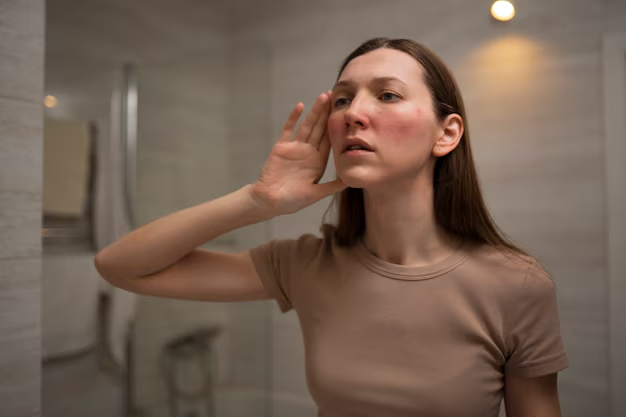Enfermedades de la piel empeoradas por el estres

Skin Diseases Worsened by Stress
Stress is an inevitable part of life, but its effects on the body extend far beyond mental health. It has been widely recognized that chronic stress can have profound consequences on physical health, including the skin. The skin, being the largest organ of the body, is particularly susceptible to stress-related conditions. The connection between stress and skin disorders is largely mediated by the immune system, hormonal fluctuations, and the nervous system. This article explores various skin diseases that are exacerbated by stress, their symptoms, and management strategies.
How Stress Affects the Skin
Stress triggers a cascade of physiological responses in the body. The hypothalamic-pituitary-adrenal (HPA) axis plays a crucial role in this process by releasing stress hormones like cortisol. While cortisol helps the body cope with short-term stress, prolonged elevation of this hormone can lead to immune system dysregulation, increased inflammation, and impaired skin barrier function. These changes make the skin more vulnerable to infections, irritants, and chronic skin conditions.
Additionally, stress influences behaviors such as scratching, picking, or neglecting skincare, all of which can further aggravate skin disorders. Below are some of the most common skin diseases that worsen due to stress.
1. Acne
Overview
Acne is one of the most common skin conditions, affecting people of all ages. It occurs when hair follicles become clogged with oil, dead skin cells, and bacteria. Stress has been identified as a major exacerbating factor for acne flare-ups.
How Stress Worsens Acne
- Increased cortisol production leads to higher oil (sebum) production, contributing to clogged pores.
- Stress weakens the immune system, making it harder to combat acne-causing bacteria.
- Anxiety and stress-related habits like touching the face and picking at blemishes can further aggravate acne.
Management
- Practice stress-reduction techniques like meditation, yoga, and deep breathing exercises.
- Maintain a consistent skincare routine with non-comedogenic products.
- Consume a balanced diet rich in antioxidants to reduce inflammation.
2. Psoriasis
Overview
Psoriasis is an autoimmune condition characterized by red, scaly patches on the skin. It is a chronic disease with periods of flare-ups and remission. Stress is a well-known trigger for psoriasis exacerbations.
How Stress Worsens Psoriasis
- Stress weakens the immune system, leading to an increase in inflammatory responses that trigger psoriasis flare-ups.
- Stress-induced behaviors, such as alcohol consumption or neglecting medication, can worsen symptoms.
Management
- Stress management strategies such as cognitive-behavioral therapy (CBT) and relaxation techniques can help reduce flare-ups.
- Topical treatments, phototherapy, and biologic medications may be required to control the condition.
- Regular exercise and a healthy diet can play a role in managing symptoms.
3. Eczema (Atopic Dermatitis)
Overview
Eczema, also known as atopic dermatitis, is a chronic inflammatory skin condition that causes dry, itchy, and inflamed skin. While genetic and environmental factors play a role, stress is a well-documented trigger.
How Stress Worsens Eczema
- Stress alters immune function, increasing inflammation in the skin.
- It disrupts the skin barrier, making it more prone to irritation and infections.
- Scratching due to anxiety or nervous habits can worsen eczema lesions.
Management
- Regular moisturizing with hypoallergenic lotions.
- Avoiding known allergens and irritants.
- Stress-reducing practices like mindfulness meditation and regular sleep hygiene.
4. Rosacea
Overview
Rosacea is a chronic skin condition that causes facial redness, visible blood vessels, and sometimes acne-like breakouts. It tends to flare up in response to various triggers, including stress.
How Stress Worsens Rosacea
- Stress-induced dilation of blood vessels worsens facial flushing.
- Increased inflammation exacerbates rosacea symptoms.
- Anxiety and stress-related behaviors, such as excessive rubbing of the face, can aggravate the condition.
Management
- Identifying and avoiding personal triggers.
- Using gentle skincare products and avoiding harsh exfoliants.
- Practicing relaxation techniques to reduce stress-related flare-ups.
5. Hives (Urticaria)
Overview
Hives, or urticaria, are red, itchy welts that appear suddenly on the skin. They can be triggered by allergic reactions, infections, or stress.
How Stress Worsens Hives
- Stress triggers histamine release, leading to increased inflammation and itching.
- Chronic stress weakens the immune system, making the skin more susceptible to hypersensitivity reactions.
Management
- Antihistamines can help reduce symptoms.
- Avoiding stress and practicing relaxation techniques can prevent recurrent outbreaks.
- Applying cool compresses can alleviate itching and discomfort.
6. Seborrheic Dermatitis
Overview
Seborrheic dermatitis is a common inflammatory skin condition that causes flaky, greasy patches on the scalp, face, and other oil-rich areas of the body. It is often associated with stress.
How Stress Worsens Seborrheic Dermatitis
- Stress can disrupt the balance of skin microbiota, leading to increased growth of Malassezia yeast, a contributing factor to seborrheic dermatitis.
- Hormonal changes induced by stress increase oil production, exacerbating symptoms.
Management
- Use of medicated shampoos containing ketoconazole, selenium sulfide, or zinc pyrithione.
- Stress-reduction techniques to prevent flare-ups.
- Maintaining good scalp hygiene.
7. Alopecia Areata
Overview
Alopecia areata is an autoimmune condition that causes hair loss in patches. It occurs when the immune system attacks hair follicles.
How Stress Worsens Alopecia Areata
- Chronic stress can trigger autoimmune responses, leading to increased hair shedding.
- Stress-related hormonal imbalances can contribute to hair loss.
Management
- Managing stress through therapy and lifestyle changes.
- Use of topical corticosteroids or immunotherapy to stimulate hair regrowth.
- Ensuring a nutritious diet rich in vitamins and minerals that support hair health.
Conclusion
The relationship between stress and skin diseases is well-documented. Chronic stress can worsen a wide range of skin conditions, from acne and eczema to psoriasis and alopecia. While stress is an unavoidable part of life, adopting effective stress-management strategies can help mitigate its impact on the skin. Lifestyle changes such as regular exercise, a balanced diet, adequate sleep, and mindfulness techniques can contribute to healthier skin. If stress-related skin conditions persist, seeking medical advice from a dermatologist or healthcare professional is essential for appropriate treatment and long-term management.



